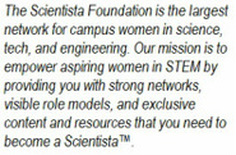|
By Amy Chan
Got a big-name professor coming to town? Paralyzed with adoration, but don’t know what to say? Well, you’re not alone. Many of us find networking difficult—even intimidating—and end up at a loss for words at the most important moments. Here, we ask three senior academic staff a series of questions to find out how they approach new contacts and build professional relationships, with helpful tips straight from the horse’s mouth. (Disclaimer: the responses that follow are personal views and do not necessarily reflect the positions and opinions of the author, the editorial staff, or The Scientista Foundation.)
“Dr. A,” Lecturer in Pharmacy Practice, The University of Auckland; Voted “People’s Choice” teaching staff 2016 by students from The University of Auckland From personal experience, Dr. A is one of the most approachable academic advisors that I have come across, and it is not surprising that she has been chosen as the “People’s Choice” teacher of 2016. Her main tip for students is to be sensitive to responses when you approach staff and have different strategies “in your toolbox,” so that you can be flexible and alter your approach “on the fly.” Q: What qualities impress you when a grad student first approaches you? A: Respectful approaches, quiet confidence and a genuine interest in my research or teaching areas—insincere, generic flattery does not work. The ability to have a two-way conversation about the subject or research—this requires a basic knowledge of the subject area and thoughts about why they think the work is important, or how it links to their own interests, and why they would like to know more or be involved. Q: What things do you first notice about a student that really stand out? A: Knowledge of the subject and a genuine desire to know more and have conversations about it. If I see them give a presentation, then confident, slick, and engaging presentations always get my attention. Someone with a plan for their future is also impressive. An interesting conversation with an interesting and enthusiastic person is always pleasant and sustains my attention. Q: What networking and communication tips do you have for grad students? A: If possible, do some preparation work before the event so that you have a little knowledge about some of the people who will be there and their interests. Most people are happy to talk about their work if you approach them respectfully and with a smile at a suitable time. This is your time to make a favorable impression. If you do make contact with people and there is potential for further developments, follow them up quickly with an email, when you leave the conference or other event. Otherwise, the momentum is easily lost. “Dr. H,” Senior Lecturer of Nursing, The University of Auckland Dr. H is involved in both undergraduate and graduate (also referred to as “postgraduate”) teaching, as well as supervision of graduate students. Her takeaway message is that “academics are just people,” and the same skills that you would use in any social setting also work well in an academic one. She says she would hope that students remember that being a professor or other academic doesn’t mean that you suddenly lose your shyness or become more articulate outside the lecture hall. She states that “most people will be flattered you want to meet them and are interested in their work.” Q: What qualities impress you when a grad student first approaches you? A: If using email, write properly: full sentences, no abbreviations, be polite and also succinct. You’d be aiming to initiate a conversation. If the academic picks up your lead, then you can be yourself. At a conference, it’s the same. Be polite: use titles (“Dr. X,” “Professor Y”) and introduce yourself—where you’re from and what you’re studying and why you know [them], [that you] have read their work. A question is often helpful, but something simple for starters—not the meaning of life or something philosophical. If [the professor has] just presented, then ask something related to their work. Or, if you’ve read their work, you could ask if they have published anything else in that area or what are they currently working on. Q: What things do you first notice about a student that really stand out? A: What I first notice is—not just for a student, but for anyone I don’t know—look tidy and together. Look like a person I’m not going to be worried about talking to. If it’s at a conference, have your name badge clearly visible, and smile. Then, when you’re close enough to talk, I’d be more relaxed already. Just introduce yourself—where you’re from and what you’re studying—and ask a question. It’s the interpersonal skills of making the other person feel relaxed and ready to converse with you. Q: What networking/communication tips do you have for grad students? A: Prepare an elevator pitch (what you can tell in the time it takes an elevator to go up 2 or 3 floors) that explains what you’re studying [or your] area of interest. Then, when you’re asked, you can give a succinct response, and later, if asked, you can provide extra details. But, communicate your main ideas or area [of interest] clearly and succinctly first. Q: What should students do to grab your attention? A: Choose their moment, just smile and say hello, introduce themselves and start a conversation. “Dr. K,” Adjunct Associate in the Department of Psychiatry and Behavioral Sciences, Adjunct Associate in the Department of Medicine, Duke University School of Medicine Dr. K is an established and highly regarded senior academic and clinical consultant, with experience working and travelling abroad. His wide breadth of both work and life experience has given him some interesting perspectives into social networks and the effect of different personal backgrounds on interpersonal relationships. He is involved in the mentorship and training of students and medical registrars and has extensive experience in research, clinical practice, and teaching. He recognises that networking can be difficult and that gender discrimination can be a fairly important issue but is not often openly discussed. Q: What qualities impress you when a grad student first approaches you ? A: Basic manners, reasonably well-dressed—they smile and introduce themselves and doesn’t[sic] assume I remember their name or institution. When I introduce myself to a senior person for networking, I usually try and be familiar with at least a piece of their work. That usually gets their attention, as people like being validated. Q: What things do you first notice about a student that really stand out? A: They are attentive, can balance listening and sharing. Sometimes students are so nervous they are mute or they talk through you like they were on a telemarketing script. [Someone who is] passionate about their work. Q: What networking/communication tips do you have for grad students? A: Unless you have a very good memory, write down names and a single line about what you talked about—maybe some personal detail that they shared—and then follow up with an email. If they offer to help you (even if you don't want it now or it wasn't exactly what you needed) thank them—in an email, not a text, unless you are close to them. Always offer to email them to remind them to send you something if a paper/reference/contact was discussed. Don't give them your email. They get large numbers of requests. Yours is one of many. In general, with people you don't know well as intimate friends, don't talk about or gossip about other people in your lab/group, supervisors, other. It may feel like bonding, especially if they bring it up with a juicy tidbit or a comment, but you still will be seen negatively as a gossip and as being indiscreet. Q: What should students do to grab your attention? A: Be direct and honest. "I'm studying in X field with Z and I think your work on Y is really interesting." Or, "I wonder if you think your lab will have an opening in the next year?" Or, "if you could offer me some brief advice..." When in doubt, always ask people about themselves. "How did you get interested in X?" "Did you plan on a career in Y?” “Did you have a sense that you would find success in academia?" People love talking about themselves, especially academics. 
About the Author
Amy Chan is currently a Research Associate with the Centre of Behavioral Medicine, University College London. Her research interests are in medication adherence, health behaviors and beliefs – understanding how and why people behave differently towards different treatments and healthcare. She is also enthusiastic about exploring how technology influences health and healthcare. Her journey through research and her work with patients has opened her eyes to the exciting world of science and clinical research, through which the work of some can help change the lives of many. She believes that "we are only people through people" and that with science and innovation, people are brought closer to each other. She is passionate about communicating science in a way that everyone can understand and aspires to be an effective science communicator. In her spare time, Amy enjoys designing, crafting, exploring new places and is a keen dance performer. Comments? Leave them below!
0 Comments
Your comment will be posted after it is approved.
Leave a Reply. |
Education BlogAbout ScientistaSubscribe!NEW!New PostsWhat's HotClick to set custom HTML
You Might Like...
Connect With UsLatest tweets |
The Scientista Foundation, Inc. All Rights Reserved © 2011-2021 | Based in NY | [email protected]
The Network for Pre-Professional Women in Science and Engineering
The Scientista Foundation is a registered 501(c)(3) -- Donate!
The Network for Pre-Professional Women in Science and Engineering
The Scientista Foundation is a registered 501(c)(3) -- Donate!


 RSS Feed
RSS Feed









